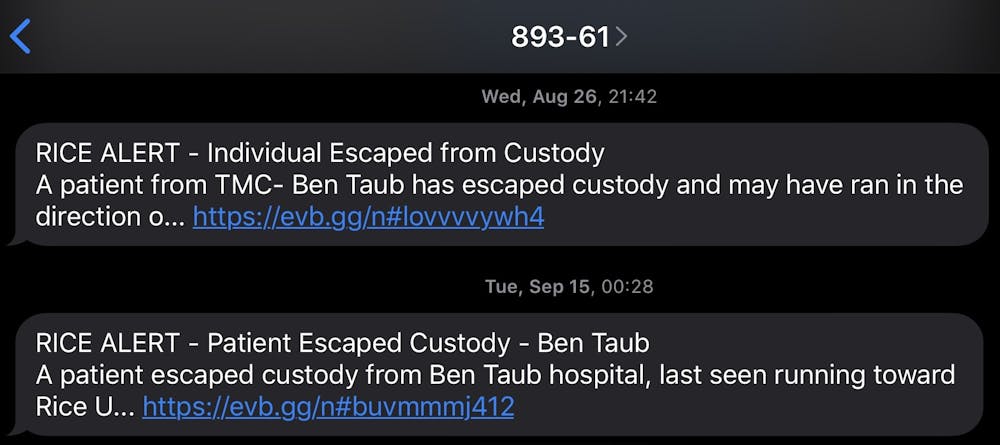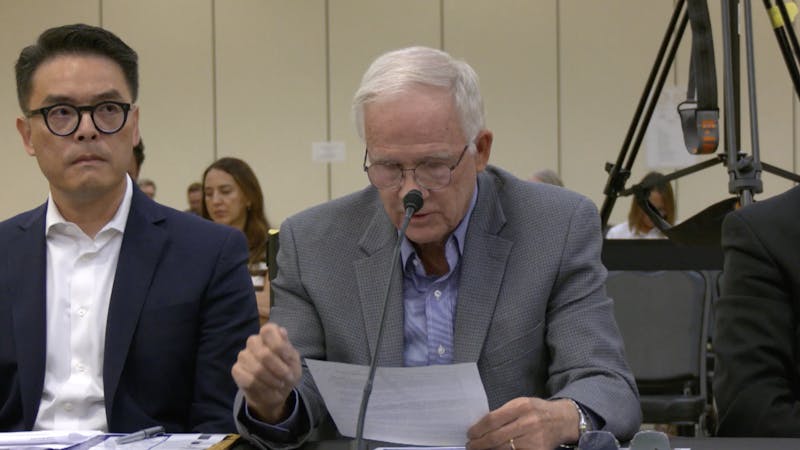Rice Alerts warn students of escaped Ben Taub patients, prompting controversy

On Sept. 15, students, faculty and staff received a Rice Alert around midnight warning them that a patient, described as a Black male, had escaped custody from Ben Taub Hospital and was running towards Rice University.
This was the second time this semester that the Rice Alerts system was used to notify students about escaped hospital patients. On Aug. 26, students received a Rice Alert in the evening about another patient, described as a Hispanic male wearing handcuffs, who had escaped custody from Ben Taub Hospital and may have run in the direction of Rice University, according to the Rice Alert. Both alerts provided students with physical descriptions of the patients and instructed students to contact Rice University Police Department if the patients were spotted.
Nathaniel Askanase, a McMurtry College junior, said he feels that the notifications are excessive.
“[The alerts are happening] significantly more than ever before and about stuff that’s of little consequence for the vast majority of recipients… it also feels kind of weird and wrong that the subject matter is ‘escaped patients,’” Askanase said.
Shifa Abdul Rahman, a Lovett College junior, said he questions how escaped patients pose a threat to Rice students as well as the overall productivity of these alerts.
“Someone who isn’t in a well condition [is] presented as [a] problem...if you see them, contact this number, be concerned where they’re looking to go,” Rahman said. “These alerts don’t say these people are armed … You [also] don’t get the medical aspect of it. What are they recovering from? Obviously we don’t want to read their personal life story, but there is no presentation… in terms of their health condition.”
Clemente Rodriguez, chief of police at RUPD, said that whether RUPD believes escaped patients pose a threat to Rice students depends on the person and situation.
“Any time a person is in police custody and escapes there is the potential for it to become a dangerous situation,” Rodriguez said. “In some of these cases the escapee may be suffering from an altered mental status, and if they’re not receiving the care or medication they need, their behavior can become erratic and unpredictable.”
According to the Rice Crisis Management website, Rice Alerts communicate emergency information through multiple channels, such as text messaging, emails, website updates, the Everbridge app and an outdoor warning system. According to Rodriguez, RUPD has been using this system for years.
With regard to the recent alerts about escaped patients, Rodriguez said RUPD learns of these events when agencies, like Ben Taub Hospital, report the incident to RUPD themselves if they believe the person fled towards campus. RUPD also monitors police radio traffic in the surrounding area, according to Rodriguez, in order to better understand what’s happening around Rice.
“We don’t generally receive responses to the alerts, but their purpose goes beyond helping us find suspects,” Rodriguez said. “The main reason we issue these messages is to notify people in the Rice community they should be alert and take precautions when necessary.”
Current students Catt Nguyen and Aanika Kashyap said they have found the alerts to be useful.
“I do think they’re useful for knowing what’s going on,” Kashyap, a Duncan College sophomore, said. “Rice is very much a bubble and [people] are very unaware [of] Houston.”
Nguyen, a Wiess College freshman, said the alerts help her feel safe
“It certainly makes me feel safer when I study late outside my college, especially with the location being specified,” Nguyen said.
While some students find the alerts to be useful, Ben Schachter and Mary Claire Neal said they believe these alerts encourage racial profiling.
“The recent Rice Alerts have stoked anxiety and further cast the Rice community as an antagonist towards our neighbors in Houston,” Schachter, a Baker College junior, said. “The alerts [encourage] recipients to racially profile Black people on campus and call the police on people potentially experiencing crises.”
Neal, a Jones College senior, said the alerts’ use of racialized language is alarming.
“A friend pointed out sometimes these Rice Alerts will try to describe how a person looks, so they will say race, but sometimes they will say words that are supposed to make you think of a race— like Hispanic,” Neal said. “Hispanic… can look like literally anything.”
More from The Rice Thresher

Rice announces Chao College as 12th residential college
Rice announced that the 12th residential college will be named Ting Tsung and Wei Fong Chao College Aug. 19. The college, set to open in fall 2026, will contain nearly 300 on-campus beds.
Dining access fund announced following on-campus unlimited meal swipes
Rice announced new food assistance programs on Tuesday to account for the controversial change in the on-campus meal swipe plan.

Rice disaster prediction model discussed at hearing on deadly Central Texas floods
The House and Senate Select Committees on Disaster Preparedness and Flooding held a hearing on July 31 in Kerrville to address the deadly July 4 flooding in Central Texas. The flooding along the banks of the Guadalupe River killed 108 people, including 37 children. In the charged hearing, Texas lawmakers and flood survivors criticized the local response to the disaster.


Please note All comments are eligible for publication by The Rice Thresher.